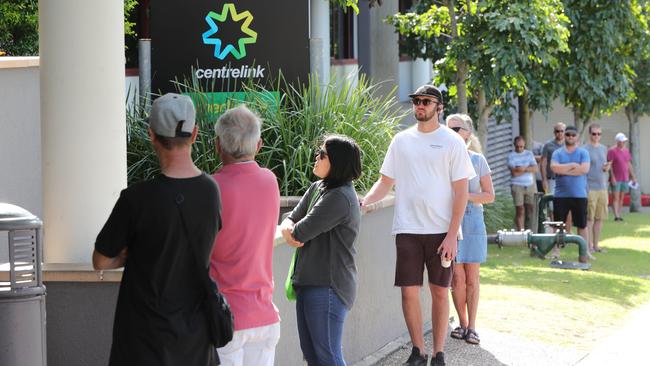Time to let go of COVID handouts and feel the pain
We put our hand out for government support, but then refuse to be tested or even download an app.

The developers coined the term to describe the position an adversary is rendered into, when “rapid dominance” is successfully deployed against them. Rapid dominance achieves shock and awe by the use of surprise, using overwhelming power on a scale rarely seen, delivered with the application of overwhelming might.
I am not saying our suffering equals the suffering of victims of war, but when COVID-19 hit it did achieve rapid dominance over us, if not medically, then fiscally.
Economically, we curled into the foetal position while our various governments tried to throw emergency blankets over everyone they could.
Right now, this is where many of us remain sheltered; employers and employee alike, under the blanket of government support. When will it be safe to throw off the covers? No one knows; maybe never.
So what is the point, then, of delaying the inevitable — do we drag this out for years or do we just get this over and done with? This week, the Reserve Bank of Australia spoke frankly about our conundrum.
RBA deputy governor Guy Debelle told an Economic Society webinar that our recession would probably scar the general economy, and that we might require ongoing fiscal and monetary policy support for years.
Although Debelle conceded that our economic performance was better than expected, he said it had still suffered a “historically large” hit that would have a long-term impact. He felt “considerable” policy support would be required for a while, including ongoing government spending. The RBA fears that an abrupt end to that support would have substantial ramifications: “If everything ceases at the end of September, yes that would be a problem.”
So here is where we find ourselves; in just over seven weeks, at the end of the beginning. Shock and awe is fading, and the new normal is being revealed.
On September 27, JobKeeper and JobSeeker payments are due to end. When this date arrives, the virus will still be with us, if not nationally, then certainly globally. There is no vaccine, no cure, and we don’t know if one will be found. Even if a vaccine is discovered, we don’t know if people can and will be forced to have it.
To be blunt, right now, the people’s relationship with their government looks like a one-way street. We put our hand out for support, and want the support to continue, but then we refuse to be tested, or even download an app.
We confront an uncertain future, yet one thing is clear. No one in any leadership capacity knows what to do next about the money. Deciding to hand it out was the easy part; deciding when and how to stop the flow is difficult.
It has been a comfort to see that our national wealth can be accessed and distributed to those who need it. Many of us had never anticipated in our wildest dreams ever requiring the assistance of the state yet have had to apply for welfare and rely on it. This has caused in a great many people an adjustment in thinking; a sense of gratitude towards government and a renewed appreciation of its role.
However, more than five million people are on JobKeeper or JobSeeker. This year, before the crisis, it was estimated that about 13.1 million people in Australia were employed. This means that now, a little more than 38 per cent of our potential workforce is on welfare. This situation is untenable, surely. Some tough decisions have to be made. They may be unpopular. Are our leaders willing to be disliked?
To answer this question, think of the decision to give large swathes of the community a huge pay rise by virtue of the JobKeeper program. This was nonsensical and a needless waste of resources. Importantly, it put the perception out there that when a crisis hits, the government will not only save you, it also will make life better. COVID-19 should never have been made into a windfall, yet for many it was.
Does our federal government have the mettle, now, to reverse that message?
The truth is, it is time for us all — individuals, business owners and employees alike — to face reality. The government has done its bit, and now we have to step up. Part of this is accepting that there is no point in continuing to prop up businesses that are unviable in the new environment.
The support that has been given has allowed us time to adjust and make other plans. In October, we have get up and walk on our own two feet. Of course there is fear, but we will have to face it. Yes, there will be pain, but we will have to experience it.
We will have to wear loss, accept less, change our expectations, find new ways of earning money, find new things to do, find new places to live and forge new lives for ourselves.
Let us be thankful that most of us are still here. The virus hasn’t run rampant through society yet, although the threat is ever present. Our leaders must be compassionate and gentle, but they need to remember, innovation comes from need, not from comfort. This is our new normal now and we must adapt.



We find ourselves in significantly reduced circumstances, which bring to mind the military theory of “shock and awe”. This term came to global prominence in 2003, but it was originally put before the US forces in 1996 as a strategic theory.